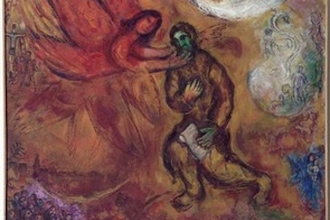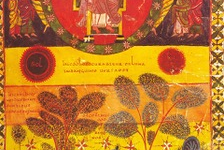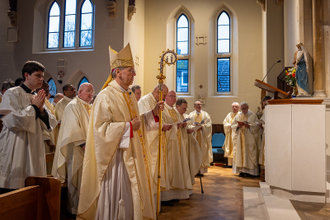Sunday Reflection with Canon Robin Gibbons: 24 July 2022

The Praying Jew by Chagall - Wikimedia
17th Sunday in Ordinary Time
Much mischief has been caused by the application of one type of activity to the biblical city of Sodom (though what of its neighbour?), and even now the stigma attached to what one might term same sex relationships finds its root in this story from Genesis, but we, with a different vision and more comprehensive understanding of the varieties of human nature, cannot and must not allow this interpretation to continue. Never mind that we have a deeper and more robust understanding of the psychological complexities of human make up, it is not good to create a chimera out of a story that basically deals with the context, yes of human relationships, but one that concerns everyone, no matter what our own sexuality might be.
Did Jesus ever use the story of Sodom to castigate anybody? No, except to place the two cities in a more favourable light than those who rejected the message of the Good News (Mt 10:14-15).
Let's look at it from another angle. Doesn't this phrase from our second reading really point to a better mind-set, a more Christian interpretation of life together: 'And even when you were dead [in] transgressions and the uncircumcision of your flesh, he brought you to life along with him, having forgiven us all our transgressions'.(Col 2: 13). That is the big clue, merciful forgiveness in Christ!
Remember always in Christ we are a new creation, at the heart of our vocation, starting with that death and raising to life in the waters of baptism, and the sealing of the Spirit in Confirmation we are called to act, behave and have as our guide Christ's values, so at the heart of our faith are these words which I hope we say at least daily, that prayer Jesus teaches us, quoted in our Gospel today:
' and forgive us our sins
for we ourselves forgive everyone in debt to us.'(Lk 11: 4).
In this convoluted tale of Sodom and Gomorrah, which is really about the abuse of others, in the sense of real aggressive inhospitality, the God of Abraham is suddenly drawn into the maelstrom of this mess to adjudicate on the quality of mercy we are expected to share, live and show towards others. The presence of the Lord in those enigmatic angels we met last week at Mamre go forward into the place of grave sin, just as our God does not avoid us in our mess but meets us there to deal with the realities of any situation. Abraham asks several questions of his God, but always at the heart of it is this ,'will you sweep away the innocent with the guilty ?' That rhythm of question and answer is one of those great moments where we can sense the real tension in that dialogue between Abraham and the Lord, where suddenly in a story that seems to be mired in sin, another quality reaches into the story to change its direction, this dialogue in its own way is a sacred encounter, because it has at its heart the image of Abraham pressing hard on the Lord, squeezing out the real answer, will you spare the innocent? And the Merciful One answers yes! Abraham stops at the number of ten innocent persons, possibly because he is so fearful of asking anything less, but we know, that the real answer is yes, even to one, and that one is the Christ!
So perhaps we can be more revolutionary in our exegesis of such passages of Scripture, the story of Sodom seen here is really about the absolute quality of mercy, nothing much to do with sex at all. That might make us a bit braver, also courageous in taking on board publically the teachings of the Christ who demands of us forgiveness, as we ourselves shall be forgiven. None of us have cause to ever be triumphant in the face of another's fall from grace, none of us have cause to cast judgement on others in terms of who they really are. In Shakespeare's Merchant of Venice, Act 4 Scene 1, Portia, disguised as the Lawyer makes a speech to Shylock mentioning the 'quality of mercy'. Unlike the Holy One who is mercy, we have to learn its way, maybe Portia's words might help us, for she points out that God's mercy cannot be constrained :
'The quality of mercy is not strained.
It droppeth as the gentle rain from heaven
Upon the place beneath. It is twice blest:
It blesseth him that gives and him that takes'.
But she then reminds us that we need to work at it for one very good reason, it is an attribute of God which we cannot do without :
'Though justice be thy plea, consider this:
That in the course of justice none of us
Should see salvation. We do pray for mercy,
And that same prayer doth teach us all to render'.
Jesus calls us to this daily, forgive as we would be forgiven, but in doing so let go of our barriers and burdens to become simpler yet, to open the door to the mercy of God which is our true conversion of heart : '"And I tell you, ask and you will receive; seek and you will find; knock and the door will be opened to you. For everyone who asks, receives; and the one who seeks, finds; and to the one who knocks, the door will be opened. (Lk 11: 9,10)
Lectio Divina
Dietrich Bonhoeffer
The Cost of Discipleship
"Blessed are the merciful, for they shall obtain mercy.' These men without possessions or power, these strangers on Earth, these sinners, these followers of Jesus, have in their life with him renounced their own dignity, for they are merciful. As if their own needs and their own distress were not enough, they take upon themselves the distress and humiliation of others. They have an irresistible love for the down-trodden, the sick, the wretched, the wronged, the outcast and all who are tortured with anxiety. They go out and seek all who are enmeshed in the toils of sin and guilt. No distress is too great, no sin too appalling for their pity. If any man falls into disgrace, the merciful will sacrifice their own honour to shield him, and take his shame upon themselves."
St Serpahim of Sarov
You cannot be too gentle, too kind. Shun even to appear harsh in your treatment of each other. Joy, radiant joy, streams from the face of one who gives and kindles joy in the heart of one who receives.
God is a fire that warms and kindles the heart and inward parts. Hence, if we feel in our hearts the cold which comes from the devil - for the devil is cold - let us call on the Lord. He will come to warm our hearts with perfect love, not only for Him but also for our neighbour, and the cold of him who hates the good will flee before the heat of His countenance.


















